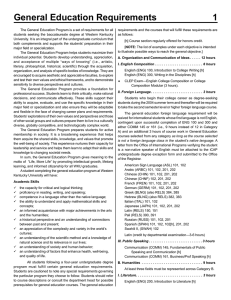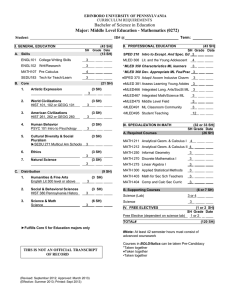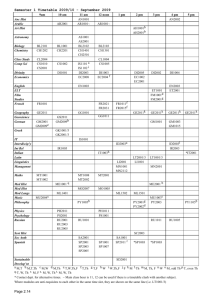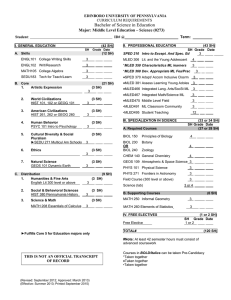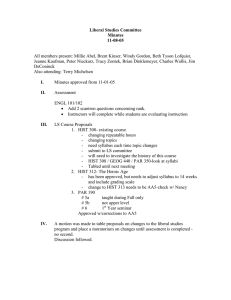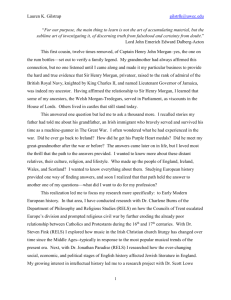General Education Requirements
advertisement
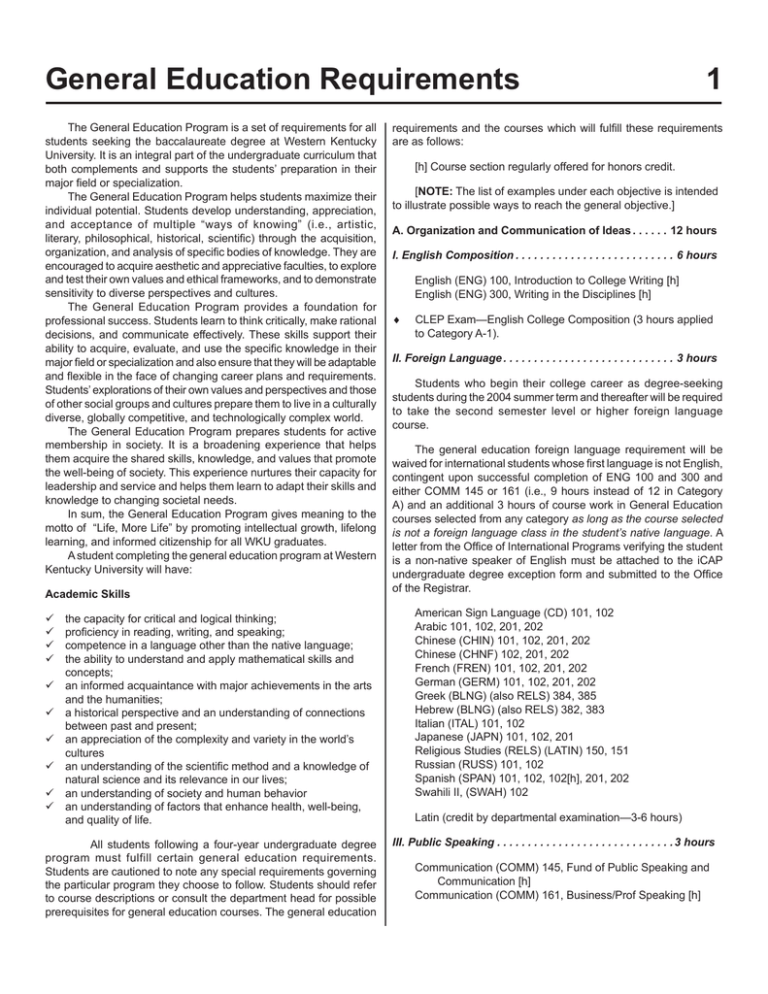
General Education Requirements The General Education Program is a set of requirements for all students seeking the baccalaureate degree at Western Kentucky University. It is an integral part of the undergraduate curriculum that both complements and supports the students’ preparation in their major field or specialization. The General Education Program helps students maximize their individual potential. Students develop understanding, appreciation, and acceptance of multiple “ways of knowing” (i.e., artistic, literary, philosophical, historical, scientific) through the acquisition, organization, and analysis of specific bodies of knowledge. They are encouraged to acquire aesthetic and appreciative faculties, to explore and test their own values and ethical frameworks, and to demonstrate sensitivity to diverse perspectives and cultures. The General Education Program provides a foundation for professional success. Students learn to think critically, make rational decisions, and communicate effectively. These skills support their ability to acquire, evaluate, and use the specific knowledge in their major field or specialization and also ensure that they will be adaptable and flexible in the face of changing career plans and requirements. Students’ explorations of their own values and perspectives and those of other social groups and cultures prepare them to live in a culturally diverse, globally competitive, and technologically complex world. The General Education Program prepares students for active membership in society. It is a broadening experience that helps them acquire the shared skills, knowledge, and values that promote the well-being of society. This experience nurtures their capacity for leadership and service and helps them learn to adapt their skills and knowledge to changing societal needs. In sum, the General Education Program gives meaning to the motto of “Life, More Life” by promoting intellectual growth, lifelong learning, and informed citizenship for all WKU graduates. A student completing the general education program at Western Kentucky University will have: Academic Skills the capacity for critical and logical thinking; proficiency in reading, writing, and speaking; competence in a language other than the native language; the ability to understand and apply mathematical skills and concepts; an informed acquaintance with major achievements in the arts and the humanities; a historical perspective and an understanding of connections between past and present; an appreciation of the complexity and variety in the world’s cultures an understanding of the scientific method and a knowledge of natural science and its relevance in our lives; an understanding of society and human behavior an understanding of factors that enhance health, well-being, and quality of life. All students following a four-year undergraduate degree program must fulfill certain general education requirements. Students are cautioned to note any special requirements governing the particular program they choose to follow. Students should refer to course descriptions or consult the department head for possible prerequisites for general education courses. The general education requirements and the courses which will fulfill these requirements are as follows: [h] Course section regularly offered for honors credit. [NOTE: The list of examples under each objective is intended to illustrate possible ways to reach the general objective.] A. Organization and Communication of Ideas. . . . . . . 12 hours I. English Composition. . . . . . . . . . . . . . . . . . . . . . . . . . . 6 hours English (ENG) 100, Introduction to College Writing [h] English (ENG) 300, Writing in the Disciplines [h] ♦ CLEP Exam—English College Composition (3 hours applied to Category A-1). II. Foreign Language. . . . . . . . . . . . . . . . . . . . . . . . . . . . . 3 hours Students who begin their college career as degree-seeking students during the 2004 summer term and thereafter will be required to take the second semester level or higher foreign language course. The general education foreign language requirement will be waived for international students whose first language is not English, contingent upon successful completion of ENG 100 and 300 and either COMM 145 or 161 (i.e., 9 hours instead of 12 in Category A) and an additional 3 hours of course work in General Education courses selected from any category as long as the course selected is not a foreign language class in the student’s native language. A letter from the Office of International Programs verifying the student is a non-native speaker of English must be attached to the iCAP undergraduate degree exception form and submitted to the Office of the Registrar. American Sign Language (CD) 101, 102 Arabic 101, 102, 201, 202 Chinese (CHIN) 101, 102, 201, 202 Chinese (CHNF) 102, 201, 202 French (FREN) 101, 102, 201, 202 German (GERM) 101, 102, 201, 202 Greek (BLNG) (also RELS) 384, 385 Hebrew (BLNG) (also RELS) 382, 383 Italian (ITAL) 101, 102 Japanese (JAPN) 101, 102, 201 Religious Studies (RELS) (LATIN) 150, 151 Russian (RUSS) 101, 102 Spanish (SPAN) 101, 102, 102[h], 201, 202 Swahili II, (SWAH) 102 Latin (credit by departmental examination—3-6 hours) III. Public Speaking. . . . . . . . . . . . . . . . . . . . . . . . . . . . . 3 hours Communication (COMM) 145, Fund of Public Speaking and Communication [h] Communication (COMM) 161, Business/Prof Speaking [h] General Education Requirements B. Humanities . . . . . . . . . . . . . . . . . . . . . . . . . . . . . . . . . . 9 hours Religious Studies (RELS) 101, The Old Testament/Hebrew Scriptures Religious Studies (RELS) 102, Introduction to Religious Studies [h] Religious Studies (RELS) 305, Christian Religious Traditions Religious Studies (RELS) 323, Social Ethics Spanish (SPAN) 373, Spanish Civilization and Culture Theatre (THEA) 151, Theatre Appreciation At least three fields must be represented across Category B. I. Literature. . . . . . . . . . . . . . . . . . . . . . . . . . . . . . . . . . . . . 3 hours English (ENG) 200, Introduction to Literature [h] English (ENG) 398, Hemingway and Faulkner (Honors participation or 3.2 GPA required) French (FREN) 314, Introduction to French Literature German (GERM) 314, Introduction to German Literature Humanities (HUM) 172, Literature/Medieval/Renaissance Europe Humanities (HUM) 182, Literature/Modern Western World Humanities (HUM) 192, Lit and Drama/Ancient Greece and Rome Spanish (SPAN) 374, Literature and Culture of Spain Spanish (SPAN) 376, Literature and Culture of Latin America ♦ CLEP Exam—Humanities (6 hours: 3 hours applied to B-I; 3 hours applied to B-II). II. Electives. . . . . . . . . . . . . . . . . . . . . . . . . . . . . . . . . . . . . 6 hours Architectural & Manufacturing Sciences (AMS) 180, Prin. of Architectural Practice Art (ART) 100, Art Appreciation [h] Art (ART) 105, History of Art to 1300 Art (ART) 106, History of Art since 1300 Dance (DANC) 110, Dance Appreciation French (FREN) 323, French Civilization and Culture German (GERM) 333, German Civilization and Culture German (GERM) 335, Contemporary Culture and Civilization History (HIST) 305, Ancient Greece History (HIST) 306, Ancient Rome History (HIST) 307, The Middle Ages History (HIST) 317, Renaissance Europe History (HIST) 318, Age of Reformation Humanities (HUM) 171, Fine Arts/Medieval/Renaissance Europe Humanities (HUM) 173, Phil/Religion Medieval/Ren. Europe Humanities (HUM) 181, Fine Arts/Modern Western World Humanities (HUM) 183, Phil/Religion/Modern Western World Humanities (HUM) 191, Fine Arts of Ancient Greece and Rome Humanities (HUM) 193, Religion/Phil/Ancient Greece and Rome Music (MUS) 120, Music Appreciation [h] Music (MUS) 326, Music History I Music (MUS) 327, Music History II Philosophy (PHIL) 101, Truth and Relativism Philosophy (PHIL) 102, The Good and the Beautiful Philosophy (PHIL) 103, The Committed Life Philosophy (PHIL) 201, Love and Friendship Philosophy (PHIL) 215, Elementary Logic Philosophy (PHIL) 320, Ethics [h] Philosophy (PHIL) 321, Morality and Business Philosophy (PHIL) 322, Biomedical Ethics Philosophy (PHIL) 323, Social Ethics Religious Studies (RELS) 100, The New Testament ♦ CLEP Exam—Humanities (6 hours: 3 hours applied to B-I; 3 hours applied to B-II). ♦ When CLEP examination credit is used in Category BII, additional credit may be earned in any course in Category B-II. C. Social and Behavioral Sciences. . . . . . . . . . . . . . . . . 9 hours At least three fields must be represented; History 119 or History 120 is required. Agriculture (AGRI) 108, Rural Sociology Anthropology (ANTH) 125, Intro to Biological Anthropology Anthropology (ANTH) 130, Intro to Archaeology Consumer and Family Sciences (CFS) 311, Family Relations [h] Economics (ECON) 150, Introduction to Economics [h] Economics (ECON) 202, Principles of Economics (micro) Economics (ECON) 203, Principles of Economics (macro) Finance (FIN) 161, Personal Finance Folk Studies (FLK) 371, Urban Folklore Geography (GEOG) 216, Geographic Information Science and Society Geography (GEOG) 350, Economic Geography Geography (GEOG) 360, Geography of North America Geography (GEOG) 471, Natural Resource Management Geography (GEOG) 480, Urban Geography Gerontology (GERO) 100, Intro to the Aging Experience History (HIST) 119, Western Civilization to 1648 [h] History (HIST) 120, Western Civilization since 1648 [h] Leadership Studies (LEAD) 200, Introduction to Leadership Studies Philosophy (PHIL) 202, Racial Justice Political Science (PS) 110, American National Government [h] Political Science (PS) 250, International Politics [h] Political Science (PS) 260, Intro to Comparative Politics Political Science (PS) 267, Introduction to East European Studies Psychology (PSY) 100, Introduction to Psychology [h] Psychology (PSY) 199, Intro to Developmental Psychology [h] Psychology (PSY) 350, Social Psychology Recreation (REC) 200, Introduction to Recreation Religious Studies (RELS) 202, Racial Justice Religious Studies (RELS) 325, Religion in Contemporary America Social Work (SWRK) 101, Foundations of Human Services [h] Sociology (SOCL) 100, Introductory Sociology [h] Sociology (SOCL) 210, Interaction: Self in Society Sociology (SOCL) 220, Marriage and Family Women’s Studies (WOMN) 200, Introduction to Women’s Studies [h] General Education Requirements ♦ CLEP Exam—Social Science-History (6 hours: 3 hours applied in Category C and 3 hours applied as elective) ♦ When 3 hours of CLEP examination credit are used in Category C, additional credit may be earned by taking courses from two different fields in Category C, including History 119 or 120. D. Natural Sciences—Mathematics. . . . . . . . . . . . . . . . . 9 hours At least two fields must be represented in Science (D-I) including at least one course designated as a lab course. At least three hours in this category must be in Mathematics (D-II). I. Science. . . . . . . . . . . . . . . . . . . . . . . . . . . . . Minimum 6 hours Agriculture (AGRI) 101, The Science of Agriculture [h] Agriculture (AGRI) 280, Intro/Environmental Science Architectural and Manufacturing Sciences (AMS) 210, Introduction to Technology Astronomy (ASTR) 104, Astronomy of the Solar System (DL) Astronomy (ASTR) 106, Astronomy of Stellar Systems (DL) Astronomy (ASTR) 108, Descriptive Astronomy Astronomy (ASTR) 214, General Astronomy (DL) Biology (BIOL) 113, General Biology Biology (BIOL) 114, General Biology Laboratory (DL) Biology (BIOL) 120, Biological Concepts; Cells, Metabolism and Genetics [h] Biology (BIOL) 121, Biological Concepts; Cells, Metabolism and Genetics Lab (DL) Biology (BIOL) 122, Biological Concepts; Evolution, Diversity and Ecology Biology (BIOL) 123, Biological Concepts; Evolution, Diversity and Ecology Lab (DL) Biology (BIOL) 131, Human Anatomy and Physiology (DL) Biology (BIOL) 207, General Microbiology Biology (BIOL) 208, General Microbiology Lab (DL) Biology (BIOL) 302, Human Biology Chemistry (CHEM) 101, Introduction to Chemistry (DL) Chemistry (CHEM) 102, Introduction to Chemistry Lab (DL) Chemistry (CHEM) 105, Fundamentals of General Chemistry Chemistry (CHEM) 106, Fundamentals of General Chemistry Lab (DL) Chemistry (CHEM) 109, Chemistry for the Health Sciences Chemistry (CHEM) 111, Introduction to Forensic Chemistry (DL) Chemistry (CHEM) 116, Introduction to College Chemistry Chemistry (CHEM) 120, College Chemistry I [h] Chemistry (CHEM) 121, College Chemistry I Lab (DL) [h] Chemistry (CHEM) 280, Intro/Environmental Science Environmental Science (ENV) 280, Intro/Environmental Science Geography (GEOG) 100, Intro to the Physical Environment [h] Geography (GEOG) 121, Meteorology (DL) Geography (GEOG) 280, Intro/Environmental Science Geology (GEOL) 102, Introduction to Geology Geology (GEOL) 111, The Earth Geology (GEOL) 113, The Earth Lab (DL) Geology (GEOL) 112, Earth History Geology (GEOL) 114, Earth History Lab (DL) Physics (PHYS) 100, Energy Physics (PHYS) 101, Concepts of Motion (DL) Physics (PHYS) 103, Light, Color and Vision (DL) Physics (PHYS) 105, Concepts of the Physical World (DL) Physics (PHYS) 130, Acoustics of Music and Speech (DL) Physics (PHYS) 180, Introduction to Modern Physics Physics (PHYS) 181, Lab-Introduction to Modern Physics (DL) Physics (PHYS) 201, College Physics I (DL) Physics (PHYS) 231, Introduction to Physics and Biophysics I Physics (PHYS) 232, Physics Lab for 231 (DL) Physics (PHYS) 255, University Physics Physics (PHYS) 256, University Physics Lab (DL) Public Health (PH) 280, Intro/Environmental Science ♦ CLEP Exam—Natural Science 6 hours: 3 hours applied as Biological Sciences and 3 hours applied as Physical Sciences) ♦ When 6 hours of CLEP examination credit are used in Category D-I, an additional lab must be taken to fulfill Category D-I. (DL) Designated Lab course. II. Mathematics. . . . . . . . . . . . . . . . . . . . . . . . .Minimum 3 hours Math (MATH) 109, General Mathematics Math (MATH) 116, Fundamentals of College Algebra [h] Math (MATH) 117, Trigonometry Math (MATH) 118, College Algebra and Trigonometry Math (MATH) 119, Fundamentals of Calculus Math (MATH) 122, Calculus of a Single Variable I Math (MATH) 136, Calculus I [h] Math (MATH 142, Calculus with Applications for Life Sciences Math (MATH) 183, Statistics ♦ CLEP Exam - Mathematics (6 hours) ♦ When 6 hours of CLEP examination credit are earned in mathematics, 3 hours may be used in fulfilling the requirement in Category D-II and the additional 3 hours credit may be used as elective credit. E. World Cultures and American Cultural Diversity . . . 3 hours African American Studies (AFAM) 190, African American Experience [h] African American Studies (AFAM) 350, Peoples and Cultures of Africa African American Studies (AFAM) 358, Blacks/Amer Hist to 1877 African American Studies (AFAM) 359, Blacks/Amer Hist since 1877 African American Studies (AFAM) 360, History of Africa African American Studies (AFAM) 368, African Governments and Politics African American Studies (AFAM) 377, African American Folklife African American Studies (AFAM) 393, African American Lit African American Studies (AFAM) 410, African American Music General Education Requirements Anthropology (ANTH) 120, Introduction to Cultural Anthropology [h] Anthropology (ANTH) 277, Introduction to World Music Anthropology (ANTH) 335, Old World Prehistory Anthropology (ANTH) 336, New World Prehistory Anthropology (ANTH) 343, Anthropology of Gender Anthropology (ANTH) 350, Peoples and Cultures of Africa Anthropology (ANTH) 410,African-American Music Communication (COMM) 263, Fundamentals of Communication and Culture Consumer and Family Sciences (CFS) 170, Introduction to International Food and Culture Dance (DANC) 360, Dance in Culture Design, Merchandising, and Textiles (DMT) 346, Architecture/ Culture (Honors participation or 3.2 GPA required.) Design, Merchandising, and Textiles (DMT) 431, Clothing and Human Behavior English (ENG) 370, Multicultural Literature in America English (ENG) 387, Studies in Autobiography English (ENG) 393, African American Literature Folk Studies (FLK) 277, Introduction to World Music Folk Studies (FLK) 280, Cultural Diversity in U.S. [h] Folk Studies (FLK) 350, Peoples and Cultures of Africa Folk Studies (FLK) 377, African American Folklife Folk Studies (FLK) 410, African American Music Geography (GEOG) 110, World Regional Geography [h] Geography (GEOG) 200, Introduction to Latin America Health Care Administration (HCA) 347, International Comparisons of Health Care System History (HIST) 110, Introduction to Asian Civilizations History (HIST) 200, Introduction to Latin America History (HIST) 353, Indian Peoples of North America History (HIST) 358, Blacks in American History to 1877 History (HIST) 359, Blacks in American History since1877 History (HIST) 360, History of Africa History (HIST) 364, Latin America: Colonial Period History (HIST) 365, Latin America: The Republics History (HIST) 370, Modern South Asia History (HIST) 461, Modern East Asia History (HIST) 463, 1492 and the Atlantic World: The Intersection of Cultures Music (MUS) 119, Jazz Appreciation Music (MUS) 277, Introduction to World Music Political Science (PS) 200, Introduction to Latin America Political Science (PS) 365, Government and Politics of the Middle East Political Science (PS) 366, Government and Politics of East Asia Political Science(PS) 368, African Government and Politics Religious Studies (RELS) 103, Religions of Asia Religious Studies (RELS) 302, Buddhist Religious Traditions Religious Studies (RELS) 303, Hindu Religious Traditions Religious Studies (RELS) 304, Judaic Religious Traditions Religious Studies (RELS) 306, Islamic Religious Traditions Religious Studies (RELS) 307, Native American Religious Traditions Religious Studies (RELS) 308, East Asian ReligiousTraditions Religious Studies (RELS) 320, Religions of the Middle East Religious Studies (RELS) 324, Christianity in Africa Sociology (SOCL) 353, Sociology of Modern Japan Sociology (SOCL) 362, Race, Class and Gender Sociology (SOCL) 375, Diversity in American Society Spanish (SPAN) 200, Introduction to Latin America Spanish (SPAN) 372, Latin American Civilization and Culture International Baccalaureate (IB) Exam in History of Africa, History of West South Asia, and History of East Southeast Asia accepted F. Health and Wellness. . . . . . . . . . . . . . . . . . . . . . . . . . . 2 hours Animal Science (ANSC) 232, Basic Equitation Consumer and Family Sciences (CFS) 111, Human Nutrition Dance (DANC) 108, Beginning Men’s Ballet Technique Dance (DANC) 111, Ballet I Dance (DANC) 113, Jazz I Dance (DANC) 117, Modern I Dance (DANC) 211, Ballet II Dance (DANC) 213, Jazz II Dance (DANC) 217, Modern II Dance (DANC) 311, Ballet III Dance (DANC) 313, Jazz III Dance (DANC) 317, Modern III Military Science (MIL) 101, Military Mountaineering and Leadership Music (MUS) 347, Marching Band Performance (PERF) 105, Taiji Performance (PERF) 110 Mat Pilates Physical Education (PE) 100, Concepts of Lifetime Fitness and Wellness Physical Education (PE) 101, 102, Activity Course Psychology (PSY) 250, Adjustment and Personal Growth Public Health (PH) 100, Personal Health Public Health (PH) 111, Human Nutrition Public Health (PH) 165, Drug Abuse Safety (SFTY) 171, Safety and First Aid Total Minimum General Education Requirements. . . . . . 44 hours 05/2011
